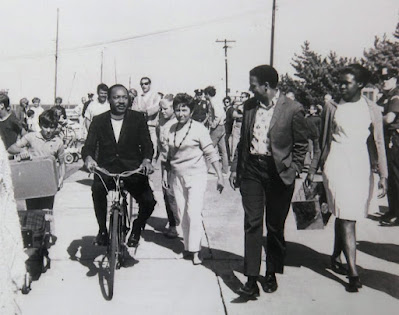Last week, I wrote two posts that might indicate a future direction for this blog. (Don't worry, I'll still write about my rides, bikes and all things related to them!) One post, about a German study, discussed who is becoming a new cyclist, and why. The other discussed a mechanics' petition calling for repairable bicycles: Turns out, most of the new cheap bikes, which are usually the ones bought by people with limited funds, have faultily-designed frames made from shoddy materials and are equipped with proprietary parts that break easily or wear out quickly.
In brief, those new cyclists on nice new bikes bought in Cannondale, Giant, Specialized or Trek showrooms are mainly people with advanced educations who live in fashionable or gentrifying urban areas. They might be riding to work or school, or simply for exercise and, as often as not, they are signaling that they care about their health and/or the environment. In other words, they are cycling by choice.
On the other hand, folks buying the cheap bikes, if they're not cycling for the first time in decades and therefore don't want to spend a lot of money, are buying that big-box special in a big box because they can't afford anything else, including a bus or train pass--if indeed there is a bus or train that will get them from wherever they sleep to wherever they work.
One of the sad ironies--following the logic of the German study--is that we see a kind of social, economic, racial and gender segregation that would have astounded or appalled the man who is being commemorated today in the US: Martin Luther King Jr.
Now, I don't think King would have denounced cycling or cyclists per se: He was often seen riding, which he probably saw as a way of bringing him closer to some of the people he was trying to help. And, because he was turning more of his attention to economic justice issues in his last days, I can somehow see him advising bike share organizations on ways to bridge the cultural divides and media representations that cause some people to believe they can't ride because they're not white and don't look good in lycra--or those who harass cyclists because they see us as entitled jerks (the educated riders of the German study) or the scum of the earth (cf. police who are trained to automatically assume that any cyclist in a low-income neighborhood is a criminal).
So...while I wasn't thinking specifically of King, or any activist in particular, when I was writing the posts I've linked in this post, thinking about King today is causing me to realize that my almost half a century of cycling--and nearly two decades of living as a woman--makes it all but impossible not to connect my experiences and even the things I most love (bicycling, reading, writing, food, travel, animals) to questions of justice. In other words, the work of Martin Luther King Jr is one of the major byways, if you will, of my journey.
